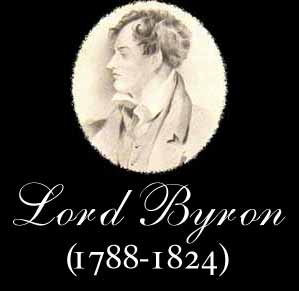After having my students read out loud the below selections, I ask my them again for the thousandth time for their opinions on a piece of writing: "Which is more clear?" "Which is more powerful?" "Which do you like better?" "Which is more EFFECTIVE?" I always ask this last question, for bad writing is only bad insofar as it is not effective.The words of Byron, in my opinion, are immortal; and the words of "Boohab" (the "organic hiphop metaphysician") a perfect example of barbarous postmodern drivel masquerading as clever and ironic prose. Almost to a person my students cannot understand Boohab, yet even at a tender age they find Byron powerful and moving.
I hold Boohab's writing up to my students as an extreme example of writing which is unclear and lacks a certain reverence and respect in trying to communicate an idea to a reader. Such abstruse game playing in prose is what I tell them to avoid like a disease. "Always think that the reader is in danger of failing to understand you, and say what you have to say as simply, powerfully, and artfully as you can," I constantly tell them.
You read the two selections and make up your own mind which is the better writing.
"Which is a better example of writing, in your opinion?"
"Which is more clear?"

hello world.
i'm here as a character first and then as a significant part of myself. the character boohab is a kind digital presence which reminds me, in particular fora of the world wide web that i am here for a reason and that is, if not cultural production, is an acknowledged kind of anthropological statement in progress. boohab is a kind of interactive seeker and sly provocateur of a mellow metaphysics. boohab only knows what he knows and in that way is very organic and casts himself as a 'black persistant object' for the sake of illumination. in that boohab is all about difference rather than some type of undefinable eclecticism.
boohab thinks about great diarists of literary (oral, published, corresponded, e-transacted, vulcan mind-melded) traditions of the past, present and future and recognizes it is the uniqueness of contributions that makes for their value. universially is assumed not for any purpose but merely as the acknowledgement that language is fathomable and reading / hearing does affect everyone.
boohab loves the specific, the ideosyncratic, the unusually dense and almost impenetrable complexity of narratives whose influences are traceable. causality is a fetish. your idea is my idea. all we 'own' is process and experience. yet as soon as we share them here, it makes no difference. but 'here' is just one funky little corner of the web, and boohab is not me.


 Back to Rich Geib FAQ Page
Back to Rich Geib FAQ Page